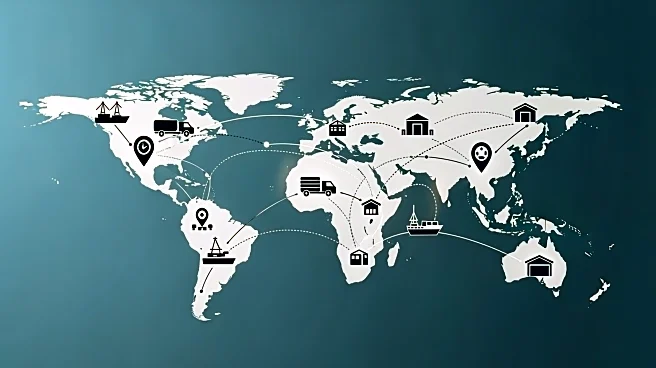What's Happening?
Inbound Logistics discusses the competitive landscape for regions seeking to become logistics hubs. The article emphasizes the importance of geographical advantages, such as proximity to major markets
and trade corridors, and the development of multimodal transportation nodes. It highlights the role of community, regional, and state resources in enhancing logistics competitiveness through infrastructure investment, policy support, and workforce development. Port Tampa Bay is cited as a successful example, with its strategic location and ongoing investments in terminal expansion and infrastructure modernization. The article outlines key strategies for regions to attract logistics operators, including leveraging regional synergies, focusing on customer efficiency, and diversifying trade lanes.
Why It's Important?
The logistics industry is a critical component of the global supply chain, impacting economic growth and competitiveness. Regions that successfully position themselves as logistics hubs can attract investment, create jobs, and enhance their economic resilience. The article underscores the importance of strategic planning and investment in infrastructure and workforce development to meet evolving logistics needs. As supply chains become more complex, regions that can offer efficient, reliable, and adaptable logistics solutions will have a competitive edge. This is particularly relevant in the context of global trade dynamics and the increasing demand for fast, cost-effective logistics services.
What's Next?
Regions aspiring to enhance their logistics profiles must prioritize continuous investment in infrastructure and workforce development. This includes maintaining and expanding transportation networks, investing in port and intermodal facilities, and developing programs to upskill the logistics workforce. Collaboration between public and private sectors, educational institutions, and industry stakeholders will be crucial in achieving these goals. As technology and trade patterns evolve, regions must adapt to remain competitive, focusing on innovation and resilience in their logistics strategies.
Beyond the Headlines
The logistics industry is undergoing significant transformation, driven by technological advancements and changing consumer expectations. Regions that embrace innovation and sustainability in their logistics strategies can position themselves as leaders in the industry. This includes adopting digital tools, enhancing supply chain transparency, and implementing environmentally friendly practices. The article highlights the importance of a holistic approach to logistics development, integrating physical infrastructure with policy, talent, and technology to create a robust logistics ecosystem.










